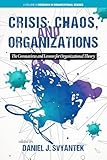Crisis, Chaos, and Organizations : the coronavirus and lessons for organizational theory / edited by Daniel J. Svyantek.
Material type: TextSeries: Research in organizational sciencesPublisher: Charlotte, NC : Information Age Publishing, Inc., [2022]Description: xv, 332 pages : illustrations ; 24 cmContent type:
TextSeries: Research in organizational sciencesPublisher: Charlotte, NC : Information Age Publishing, Inc., [2022]Description: xv, 332 pages : illustrations ; 24 cmContent type: - text
- unmediated
- volume
- 9781648027802
- 658.4/056 23/eng/20211129
- HD49 .C932 2022
| Item type | Current library | Collection | Call number | Copy number | Status | Notes | Barcode | |
|---|---|---|---|---|---|---|---|---|
 Books
Books
|
Rabdan Academy General Stacks | General Collection | HD49 .C932 2022 (Browse shelf(Opens below)) | C. 1 | Available | USD 92.62 | 22974 |
Browsing Rabdan Academy shelves,Shelving location: General Stacks,Collection: General Collection Close shelf browser (Hides shelf browser)
Includes bibliographical references.
"The COVID-19 pandemic provides an illustration of how chaotic change to large systems are caused by small, seemingly insignificant environmental events such as the initial case(s) of COVID-19 in China. From this small starting point for the pandemic, there have been (and continue to be) millions of lives lost and trillions of dollars spent trying to alleviate the effects of the COVID-19 pandemic. World government and corporate leaders are striving to deal with this pandemic, but uncertainty is felt across the globe. Unprecedented strategies (e.g., the United States government's multi-trillion-dollar stimulus package (s)) have been used to halt the spread of COVID-19. These small events cascade throughout larger and larger systems leading to unforeseeable consequences. Organizations must experiment and make decisions on how to react. Decisions must be made and implemented to see what the effects of these decisions are. The chapters in this volume provide important insights for all organizations during this time of crisis. The chapters express bottom-up and top-down approaches to a crisis-initiating environmental change by organizations. The chapters provide insight into the way organizations perceive the effect of COVID-19 as 1) a permanent or transitory change in the organization's environment; and 2) as a crisis or opportunity. Taken together, the chapters provide both scientists and practitioners with a starting point for understanding the impact of COVID-19 on organizational theory and on management practice for readers"-- Provided by publisher.
There are no comments on this title.





